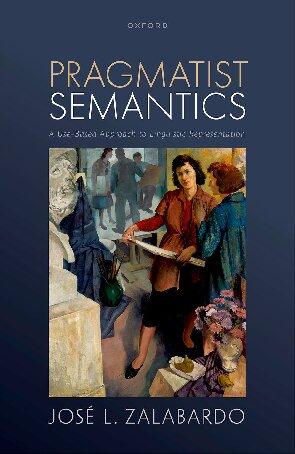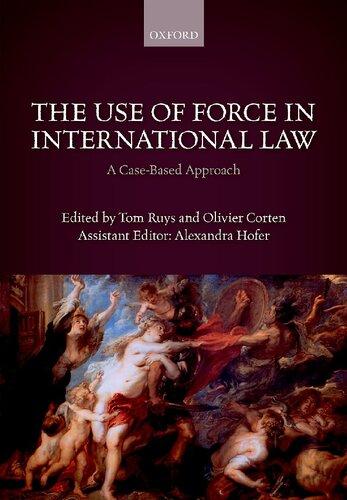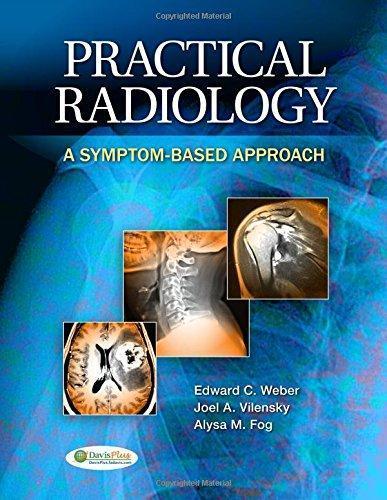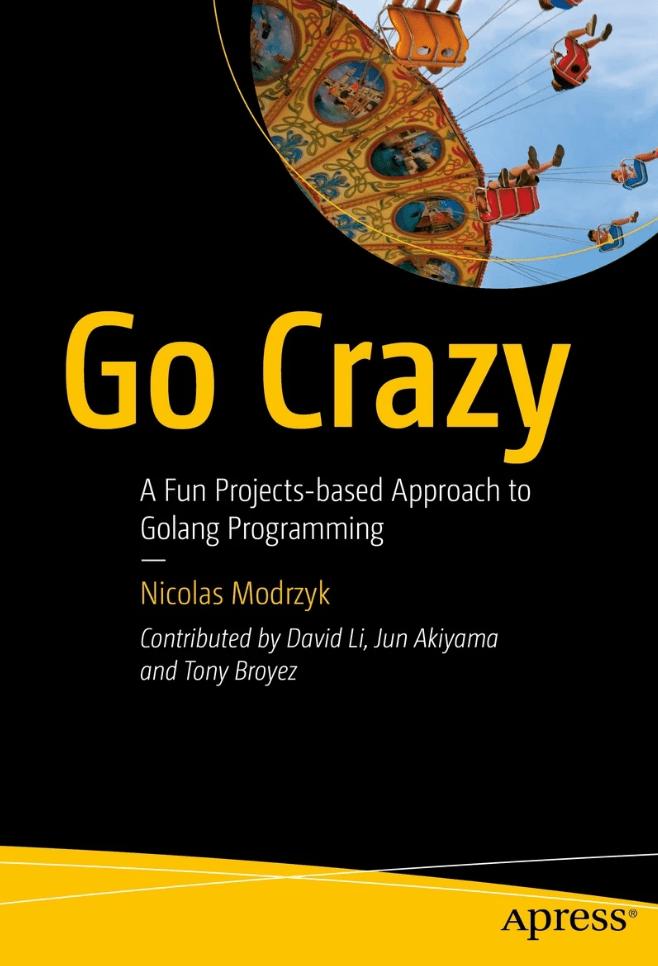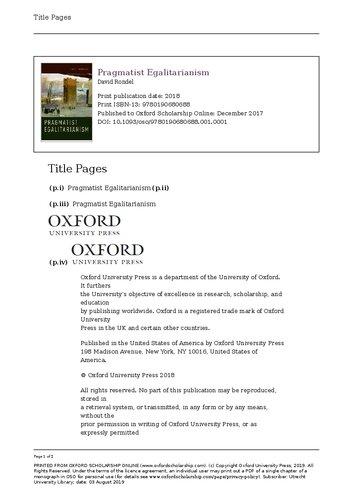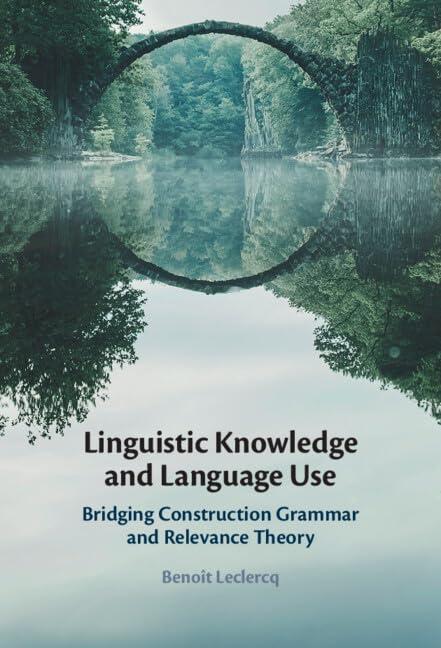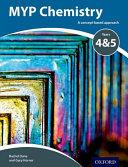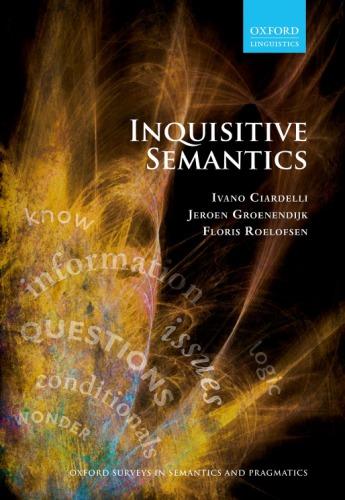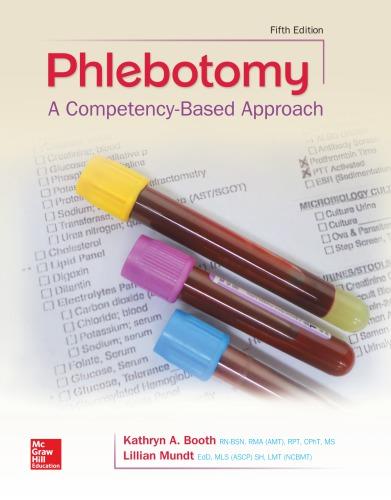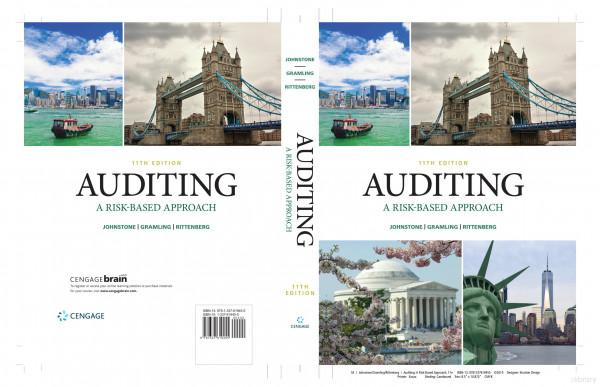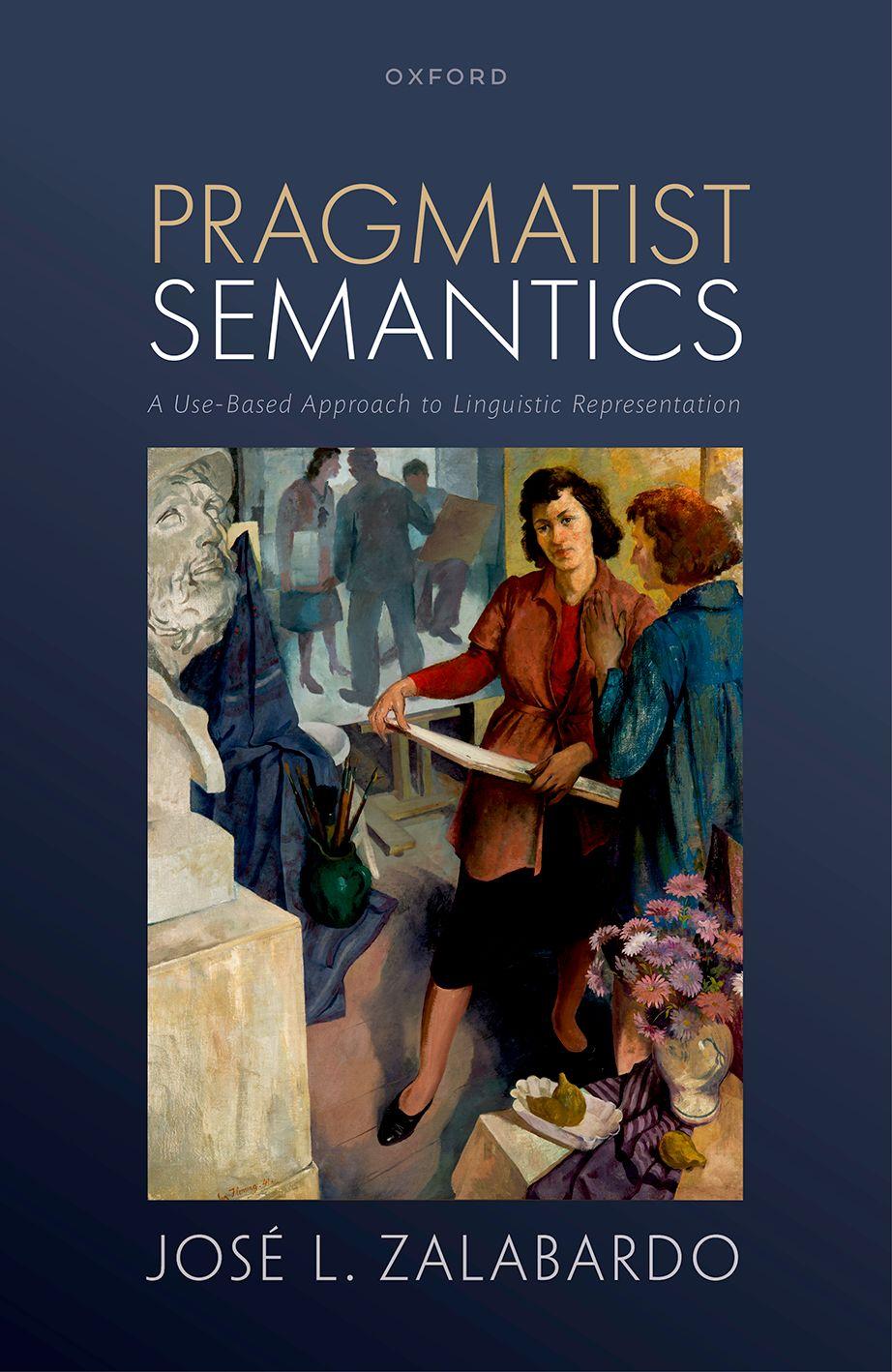Prof José L. Zalabardo
Visit to download the full and correct content document: https://ebookmass.com/product/pragmatist-semantics-a-use-based-approach-to-lingui stic-representation-prof-jose-l-zalabardo/
More products digital (pdf, epub, mobi) instant download maybe you interests ...
The Use of Force in International Law: A Case-Based Approach Tom Ruys (Editor)
https://ebookmass.com/product/the-use-of-force-in-internationallaw-a-case-based-approach-tom-ruys-editor/
Practical Radiology: A Symptom-Based Approach 1st Edition
https://ebookmass.com/product/practical-radiology-a-symptombased-approach-1st-edition/
Go Crazy: A Fun Projects-based Approach to Golang Programming 1st Edition Nicolas Modrzyk
https://ebookmass.com/product/go-crazy-a-fun-projects-basedapproach-to-golang-programming-1st-edition-nicolas-modrzyk/ Pragmatist Egalitarianism David Rondel
https://ebookmass.com/product/pragmatist-egalitarianism-davidrondel/
Linguistic Knowledge and Language Use: Bridging Construction Grammar and Relevance Theory Benoît Leclercq
https://ebookmass.com/product/linguistic-knowledge-and-languageuse-bridging-construction-grammar-and-relevance-theory-benoitleclercq/
MYP Chemistry: a Concept Based Approach (IB MYP
1st Edition Horner
https://ebookmass.com/product/myp-chemistry-a-concept-basedapproach-ib-myp-series-1st-edition-horner/
Inquisitive Semantics 1st Edition Ivano Ciardelli SERIES) https://ebookmass.com/product/inquisitive-semantics-1st-editionivano-ciardelli/
Phlebotomy: A Competency-Based Approach 5th Edition Kathryn A. Booth
https://ebookmass.com/product/phlebotomy-a-competency-basedapproach-5th-edition-kathryn-a-booth/
Auditing: A Risk Based-Approach 11th Edition JohnstoneZehms
https://ebookmass.com/product/auditing-a-risk-basedapproach-11th-edition-johnstone-zehms/
PragmatistSemantics PragmatistSemantics AUse-BasedApproachtoLinguistic Representation JOSÉL.ZALABARDO
GreatClarendonStreet,Oxford,OX26DP, UnitedKingdom
OxfordUniversityPressisadepartmentoftheUniversityofOxford. ItfurtherstheUniversity’sobjectiveofexcellenceinresearch,scholarship, andeducationbypublishingworldwide.Oxfordisaregisteredtrademarkof OxfordUniversityPressintheUKandincertainothercountries ©JoséL.Zalabardo2023
Themoralrightsoftheauthorhavebeenasserted Allrightsreserved.Nopartofthispublicationmaybereproduced,storedin aretrievalsystem,ortransmitted,inanyformorbyanymeans,withoutthe priorpermissioninwritingofOxfordUniversityPress,orasexpresslypermitted bylaw,bylicenceorundertermsagreedwiththeappropriatereprographics rightsorganization.Enquiriesconcerningreproductionoutsidethescopeofthe aboveshouldbesenttotheRightsDepartment,OxfordUniversityPress,atthe addressabove
Youmustnotcirculatethisworkinanyotherform andyoumustimposethissameconditiononanyacquirer
PublishedintheUnitedStatesofAmericabyOxfordUniversityPress 198MadisonAvenue,NewYork,NY10016,UnitedStatesofAmerica
BritishLibraryCataloguinginPublicationData Dataavailable
LibraryofCongressControlNumber:2023935136
ISBN978–0–19–287475–7
DOI:10.1093/oso/9780192874757.001.0001
PrintedandboundintheUKby ClaysLtd,ElcografS.p.A.
LinkstothirdpartywebsitesareprovidedbyOxfordingoodfaithand forinformationonly.Oxforddisclaimsanyresponsibilityforthematerials containedinanythirdpartywebsitereferencedinthiswork.
Preface ix
1.RepresentationalDiscourse1
1.1PropositionalRepresentationandMeaningGrounds1
1.2AVersionofRepresentationalism3
1.3ReferenceFailureandRepresentation8
1.4DescriptiveSemanticsandFoundationalSemantics10 1.5Conclusion13
2.TheOpen-QuestionArgumentinEthics14
2.1OpenQuestionsandSynonymy14
2.2TheNaturalistStrikesBack17
2.3TheArgumentRevised20
2.4MoralTwin-Earth28 2.5MoralMotivation33 2.6MoralIntuitionism33 2.7Conclusion35
3.TheOpen-QuestionArgumentinSemantics37 3.1TruthAscriptions37 3.2PropositionalAttitudes45
3.3Meaning49 3.4Guidance57 3.5Conclusion59
4.SomeReactions60
4.1PragmatistRepresentationalism60
4.1.1EthicalSubjectivism61
4.1.2ProtagoreanRelativism63
4.1.3Interpretivism63
4.2TheFlightfromRepresentation68
4.2.1EthicalNon-cognitivism69
4.2.2DeflationismaboutTruth72
4.2.3InstrumentalismabouttheAttitudes74
4.2.4Kripke’sScepticalSolution74
4.3RepresentationRegained77 4.4Conclusion81
5.PragmatistMeaningGrounds83
5.1AssertibilityConditions83
5.2Justification?86
5.3WittgensteinonMeaningandUse88
5.4AssertionandAcceptance91
5.5PragmatistMeaningGrounds93
5.6PragmatismandItsFellowTravellers95
5.6.1PragmatistRepresentationalismvs.GenuinePragmatism95
5.6.2Pragmatismvs.Non-cognitivism97
5.6.3RationalistPragmatism101
5.7The ‘Explanation ’ Explanation104
5.8Conclusion106
6.BeliefandDesire107
6.1Belief,Desire,Behaviour107
6.2TheIntentionalStance109
6.3IndeterminacyandCharity114
6.4TheOntogenesisoftheIntentionalStance115
6.5TheCurseofKnowledge120
6.6TheHybridPolicyandtheMeaningGroundsofBelief andDesireAscriptions121
6.7OtherConditions124
6.7.1Causation124
6.7.2Representation125
6.7.3MindReading125
6.7.4Self-Interpretations126
6.7.5LinguisticEvidence128
6.8Conclusion129
7.MeaningandTruth130
7.1RadicalTranslation/Interpretation130
7.2Compositionality132
7.3MeaningandBelief135
7.4Charity136
7.5Permutations137
7.6Familiarity140
7.7ReferenceandCausation141
7.8Projection143
7.9LinguisticInterpretationandNon-linguisticBeliefAscription144
7.10Self-Interpretation146
7.11ConsequencesofPragmatism147
7.12TruthAscriptions150
7.13RepresentationalDiscourse151
7.14Wright’sDiscipline:CognitiveCommand158
7.15IdealConditions160
7.16Conclusion161
8.HarmonyandAbstraction163
8.1TheProblemofHarmony163
8.2AnIdeaofQuine’s166
8.3Abstraction168
8.4TwoReadingsofAbstractionPrinciples170
8.5AbstractionandPredicateReference172
8.6TheTwo-WayApproach174
8.7SomeConsequencesoftheTwo-WayApproach175
8.8AbstractionandtheProblematicDiscourses178
8.9Aufhebung?180
8.10Conclusion181
9.ThePrimacyofPractice183
9.1TheoreticalScience183
9.2LewisianHumility185
9.3EpistemologicalChallengestoLewis’sArgument188
9.4QuidditismandCombinatorialism190
9.5RamseyanStructuralism193
9.6OtherOptions198
9.7PragmatistMeaningGroundsforTheoreticalScience199
9.8APragmatistProgress201
9.9PragmatistMeaningGroundsandGenuineRepresentation205
9.10ARegressArgument207
9.11Tuquoque?210 9.12Conclusion211
Epilogue:TheMeaningGroundsofMeaning-Ground Specifications213
Preface TheIntroductiontoarecentcollectivevolumestartswiththefollowing sentence:
Thereisastoryaboutthefunctionoflargepartsofourlanguage, whichis,initsbroadoutlines,intuitiveandstraightforward.Onthis view,muchofourverbalactivityisrepresentational.
(Gross,Tebben,andWiliams2015:3)
Ithinkthestoryisindeedintuitiveandstraightforward muchofourverbal activitypresupposesthatlanguagehasthepowertorepresentthingsasbeinga certainway.However,incontemporaryphilosophy,theintuitivestoryhascome underattack.Challengestotheintuitivestoryarethesubjectmatterofthe collectionfromwhichthequoteistaken.
Somechallengestotheintuitivestoryconcernspecificregionsofdiscoursethat wemightbeinclinedtoregardasrepresentational.Challengerscontendthat, contrarytoinitialappearances,thetargetdiscoursedoesn’tactuallysucceedin representingtheworld.Thiskindofchallengecomesintwoforms.Accordingto one,thetargetdiscoursehasindeedthefunctionofrepresentingtheworld,butis incapableofperformingthisfunction.Accordingtotheother,therepresentationalsurfaceofthediscoursedisguisesthefactthatitsrealfunctionisnonrepresentational.
Otherchallengestotheintuitivestoryaremorewide-ranging theycallinto questiontheveryideathatlanguageisanywhererepresentational.Representing theworld,ontheseviews,isnotamongthethingslanguageiscapableofdoing,or evenamongthethingsthatlanguageissupposedtodo.
Thesechallengestotheintuitivestoryhaveawidevarietyofsources,butIthink wecandiscernacommonpatterninmanyofthem:theyrestontheassumption thatasentencecanrepresenttheworldonlyifitsmeaningcanreceiveaparticular kindofexplanation onethatmakesreferencetosemanticrelationsbetweenthe sentenceandthebitsoftheworldthatthesentencerepresents.Thelinkbetween thepowertorepresenttheworldandexplanationsofmeaningbasedonlanguageworldconnectionsisoftentreatedasself-evident.Afterpresentingtheintuitive storyinthepassagequotedabove,theauthorsgoontocharacterize representationaltheoriesofmeaning asthoseviewswhichacceptthestory,addingthat,
accordingtothesetheories, ‘semanticcategories,suchastruthandreference,have importantexplanatoryrolestoplay’ (Gross,Tebben,andWiliams2015:3).¹With thislinkinplace,therepresentationalcharacterofadiscourseishostagetoour abilitytoprovideanexplanationofthemeaningofitssentencesinwhichsemantic notions,suchastruthorreference,playacentralrole.Ithinkthisisthemainroute throughwhichtheintuitivestoryiscalledintoquestion aspecificdiscourse,or languageasawhole,can’trepresenttheworld,thethoughtgoes,becausethe requisiteexplanationofthemeaningsofthetargetsentencesisnottobehad.
Discussionoftheseissueshasbeenparticularlyintensewithrespecttosome specificdiscourses.Ethicaldiscourseisoneofthem.Inafamiliarversionofthe problem,itgoesroughlylikethis:Youmightthinkthatthesentence ‘killingoneto save fiveismorallyright’ representsthingsasbeingacertainwaywithanaction type,butinorderforthesentencetoachievethis,ourexplanationofitsmeaning hastoinvokeaconnectionbetweenthepredicate ‘ismorallyright’ andaproperty playingtheroleofitsreferent thepropertythatwerepresentanactionas instantiatingwithasentencethatascribesthepredicatetotheaction.Butthere arepowerfulargumentssuggestingthatthereisnoplausiblecandidateforthis job nopropertythatthepredicatecouldbecrediblysaidtoreferto.
Anotherdiscourseforwhichthedifficultyarisesistruthascriptions.Inorder forthesentence ‘“thecatisonthemat” istrue’ torepresentthingsasbeinga certainwaywiththesentence ‘thecatisonthemat’,themeaningoftheformer sentencehastobeexplainedintermsofarelationbetweenthepredicate ‘istrue’ andapropertyplayingtheroleofitsreferent,andeverycandidateforthisjob exhibitsseeminglyfatalshortcomings.Similarproblemsariseforothersemantic discourses,includingbeliefascriptions,like ‘Lornabelievesthatthere’smilkin thefridge’,andmeaningascriptions,like, ‘“Tisch”,asunderstoodbyKurt, meanstable’ .
Difficultiesofthiskindhavebeenraisedforseveralotherostensiblyrepresentationaldiscourses,butmyfocusinthepresentbookwillbeonthesefour moral discourseplusthethreesemanticdiscoursesjustmentioned ascriptionsoftruth, belief,andmeaning.Infact,myrealfocuswillbeonthelastthree.Iwillalso considermoraldiscourseforitshistoricalimportanceinthedevelopmentofsome ofthecentralideasinthisarea,andtohighlightthefactthatthedifficultiesunder discussiondonotarisefromthesemanticnatureofthetargetdiscourses,but Iwon’tconsiderinmuchdetailthespecificfeaturesofthiscase.
Amajorthemeofthepresentbookisthatthesechallengestotheintuitivestory don’tsucceed,becausethelinktheypresupposebetweenrepresentationand
¹Intheabstracttotheonlineeditionofthevolumeweread: ‘Muchcontemporarythinkingabout languageisanimatedbytheideathatthecorefunctionoflanguageistorepresenthowtheworldisand that therefore thenotionofrepresentationshouldplayafundamentalexplanatoryroleinany explanationoflanguageandlanguageuse’ (myitalics).
meaning-explanationsintermsoflanguage-worldconnectionsshouldberejected. I’mgoingtoarguethatothertypesofexplanationofthemeaningofasentenceare perfectlycompatiblewiththethoughtthatthesentencesucceedsinrepresenting theworld.Iwillcontendthatthisgoes,inparticular,forexplanationsofthe meaningsofsentencesintermsofhowtheyareused.Iwillusetheterm pragmatist torefertoexplanationsofthiskind.²Mypointthenisthatadopting apragmatistexplanationofthemeaningofasentencedoesn’tpreventusfrom treatingthesentenceassuccessfullyrepresentingtheworld.
I’mgoingtoapplythisapproachinthe firstinstancetoethicaldiscourseand thethreesemanticdiscoursesmentionedabove.Iwillarguethatthemeaningsof theirsentencesshouldbeexplainedalongpragmatistlines,withouttherebygiving upontheideathattheyrepresentthingsasbeingacertainway.Lateron,Iwill exploreotherapplicationsofthepragmatistapproach,arguingthatourgraspof language-worldconnectionsacrosstheboardmightrestonpragmatistfoundations.
Iproposetounderstandthetaskofexplainingthemeaningofasentenceas aimingatspecifyingits meaningground thefactbyvirtueofwhichthesentence hasthemeaningithas.Explanationsofmeaningintermsoflanguage-world connectionscanbeconstruedasfollowingaparticularstrategyforspecifyingthe meaninggroundsofdeclarativesentences.Onthisstrategy,whatmakesasentencehavethemeaningithasisasemanticrelationtothestateofaffairsit representsasobtaining,ortotheitemswhosecombinationwouldproducethis stateofaffairs.Onthisapproach,thesentence ‘thecatisonthemat’ hasthe meaningithasbyvirtueofarelationtothestateofaffairsofthecatbeingonthe mat,ortothecat,thematandtheon-top-ofrelation.Irefertothisstrategyfor specifyingthemeaninggroundofasentenceasthe representationalistapproach. Myproposalisthatthethreattotherepresentationalstatusofethicaland semanticdiscoursesrestsontheassumptionthatpropositionalrepresentation requiresrepresentationalistmeaninggrounds thatadeclarativesentencecan dischargethefunctionofrepresentingtheworldonlyifitsmeaninggroundis representationalist.Theproblemforthetargetdiscourses,onmyconstrual,isthat attemptstoproviderepresentationalistmeaninggroundsfortheirsentencesface formidableobstacles.InChapter1,IpresentwhatIregardasthemostplausible accountofwhattherepresentationalistmeaninggroundofadeclarativesentence wouldhavetolooklike.
InChapter2Idevelopaversionoftheopen-questionargumentinsupportof theconclusionthatethicalsentencescan’thaverepresentationalmeaning grounds.Onmyconstrualoftheargument,theproblemitposesforrepresentationalismarisesfromourintuitionconcerningthecircumstancesunderwhichwe arepreparedtotakesomeoneelseasmeaningbyoneoftheirpredicateswhatwe
²Fortheideaofofferingapragmatistexplanansforasemanticexplanandum,see(Price2011a).
meanbyourethicalpredicates.InChapter3Iconsiderhowtheargumentcanbe deployedtothesameeffectforascriptionsoftruth,meaning,andpropositional attitudes.
IfthedifficultiespresentedinChapter2andChapter3arereal,weneedto decidehowtotreatthesentencesofthediscoursesthatareaffectedbythem. Chapter4isdevotedtoreviewingsomeofthestrategiesthathavebeenproposed fordealingwiththissituation.First,Iconsidertheideathatthedifficultiescanbe overcomewithversionsofrepresentationalismthatsingleoutthebitsoftheworld fromwhichsentencesobtaintheirmeaningintermsoftheproceduresemployed byspeakersforregulatingtheiracceptance.Iarguethatthisstrategyeitherfailsto solvetheproblemorproducesmanifestlyimplausiblecharacterizationsofthe meaningsofthetargetsentences.ThenIturntopositionsthatacceptthe conclusionthatthetargetdiscoursescan’tdischargethefunctionofrepresenting theworldbecausewecan’tproviderepresentationalistmeaninggroundsfortheir sentences,andreacttothisoutcomebygivinguptheideathatthefunctionof thesediscoursesisrepresentational.Onthisapproach,thetargetdiscourses actuallyhave,orshouldbeconstruedashaving,analternativenonrepresentationalfunction,thatcanbedischargedbysentenceswithoutrepresentationalmeaninggrounds.Iendbyconsideringtheviewthattheascriptionofa non-representationalfunctiontoadiscourseisperfectlycompatiblewiththeview thatitssentencessucceedinrepresentingtheworld,onceweunderstandthat thereare,infact,nosubstantiveconditionsthatadeclarativesentenceneedsto satisfyinordertocountasdischargingthefunctionofrepresentingtheworld. Iarguethatthevindicationoftherepresentationalcharacterofthetargetdiscoursesachievedbythislineofreasoningisunsatisfactory,sinceitpreservesthe contrastbetweensentencesthathavenofunctionotherthanrepresentingthe world,andthosewhoseprimaryfunctionisnon-representational,althoughthey canbecharacterizedashavingthesubsidiaryfunctionofrepresentingtheworld.
InChapter5IbegintoarticulatetheconstrualIproposetoadoptforthetarget discourses.Irejecttheassumptionthatpropositionalrepresentationrequires representationalistmeaninggrounds,maintaining,tothecontrary,thatasentence withnon-representationalistmeaninggroundsisinprincipleperfectlycapableof dischargingthetaskofrepresentingtheworld.Thenon-representationalistmeaninggroundsthatIproposetoadoptforthetargetdiscoursesare pragmatist.On thisproposal,thesentencesofthetargetdiscourseshavetheirmeaningsbyvirtue ofthefactthattheyareusedinacertainway,morespeci ficallybyvirtueofthefact thattheiracceptanceisregulatedinacertainway.Iintroducetheproposalby consideringinthe firstinstancepositionsaccordingtowhichthetargetsentences obtaintheirmeaningsfromtheirconditionsofwarrantedassertibility.Iarguethat thisapproachshouldbemodi fiedbyeliminatingitsreferencetotheepistemic notionoftheconditionsunderwhichassertionisjustified,andbyreplacing assertionwiththementalnotionofacceptance.Ontheresultingapproach,the
meaninggroundofadeclarativesentenceisprovidedbytheprocedureactually employedbyspeakersforregulatingitsacceptance.Thisisthegeneraltemplate thatIproposetoapplytothesentencesofthetargetdiscourses.Ispelloutthe differencesbetweenmyproposalandotherapproachesforwhichitmightbe easilymistaken.
InChapter6Itakeonthetaskofspecifyingpragmatistmeaninggroundsfor sentencesthatascribebeliefsanddesires.ItakeasmystartingpointDaniel Dennett’sIntentionalStance,construedasaprocedureforregulatingtheacceptanceofbeliefanddesireascriptions.Iarguethatsomeaspectsoftheresulting positionareunsatisfactory.Inparticular,apragmatistspecificationofmeaning groundsforbeliefanddesireascriptionscannotmakereference,withoutcircularity,tothenotionofwhatanagentoughttobelieveordesire.Iconcentrateon theothermainaspectoftheIntentionalStance therolethatbeliefanddesire ascriptionsplayinthepredictionofbehaviour.Thisrolesustainsanacceptance procedureforbeliefanddesireascriptions toacceptorrejectthemonthebasis ofthesuccessofthebehaviourpredictionstheygenerate.Myprovisionalproposal isthatbeliefanddesireascriptionshavethemeaningtheyhaveasaresultofour employmentofthisacceptanceprocedureforthem.Thisproposalhasone importantshortcoming:itdoesn’tregisterourpreferencefortheascriptionof truebeliefs.Iarguethatthispreferencecanbeexplainedintermsofideasfrom developmentalpsychologyconcerningtheprocedureweactuallyemployfor predictingbehaviour.Iarguethatourdefaultistopredictbehaviourthatwould beasamatteroffact(i.e.byourlights)conducivetothepromotionofthegoals we ’veascribedtotheagent.It’sonlywhenthisprocedureproducesunsatisfactory resultsthatweswitchtothemorecomplexmethodofpredictingthattheagent willbehaveinwaysthatwouldbeconducivetothepromotionofitsgoalsifthe (false)beliefswehaveascribedtoitweretrue.Thedefaultstatusofthesimpler predictivestrategyisthesourceofourreluctancetoascribefalsebelief.
InChapter7Iarticulateproposalsforpragmatistmeaninggroundsforascriptionsofmeaningandtruth.Formeaningascriptions(interpretations)Itakeasmy startingpointtheideasdefendedbyW.V.O.QuineandDonaldDavidsonunder thelabel RadicalInterpretation(/Translation).IdiscusstherolethatcompositionalityplaysinourmeaningascriptionsandIintroducetheideaofa doxastic procedure forselectinginterpretations.Aprocedureisdoxasticwhenitisbasedon thebeliefascriptionswearecommittedtobyourinterpretationofsentencesthe speakeraccepts.ThecharitycriterionendorsedbyQuineandDavidsonisa doxasticcriterion itrecommendsinterpretationsthatresultintheascriptionof truebeliefs.Iarguethatcharitybyitselfdoesn’tgenerateaplausiblecharacterizationofourinterpretativeprocedure.Isuggestthatourinterpretativeprocedure employs,inaddition,a familiarity criterion apreferenceforascribingreferents thatcanbeeasilydefinedintermsofourconcepts.Ithenarguethatcharityshould bereplacedwithanotherdoxasticcriterion projection thatrecommends
interpretationsthatresultintheascriptionofthebeliefswewouldhaveifwe foundourselvesinthespeaker ’sepistemicsituation.Icontend,inaddition,that ourinterpretativeprocedurealsotakesintoaccountnon-linguisticevidence bearingonbeliefascription ifwehaveevidenceagainstascribingabelieftothe speaker,weavoidinterpretationsthatresultintheascriptionofthisbelief.My proposalisthatmeaningascriptionsobtaintheirmeaningfromthefactthatwe usethisproceduretoregulatetheiracceptance acombinationoftheprojection andfamiliaritycriteriasupplemented,asappropriate,withnon-verbalevidence forbeliefascription.
Fortruthascriptionsmyproposalisthattheyobtaintheirmeaningfromthe factthatweregulatetheiracceptanceusingacriterionbasedonthedisquotational characterofthetruthpredicate:Weacceptanascriptionofthepredicate ‘istrue’ tooneofoursentencesjustincaseweacceptthesentence,andweacceptits ascriptiontosomeoneelse’ssentencejustincasewehaveinterpretedthesentence asrepresentingastateofaffairsthatwebelieveobtains.Ithenapplythepragmatistapproachtoascriptionsofrepresentationalcharacter sentencesthatascribe toothersentencesthefunctionofrepresentingtheworld.
Myproposalforthetargetdiscoursesinvolvesmaintainingthattheirsentences succeedinrepresentingtheworldeventhoughtheyhavepragmatist(i.e.nonrepresentationalist)meaninggrounds.Thusmyproposalisopenlyopposedtothe assumptionthatrepresentationrequiresrepresentationalistmeaninggrounds. Thisassumptionisnotwithoutsupport.InChapter8Ipresentwhatstrikesme asthemostpowerfulargumentfortheassumption.Mystrategyfordefusingthis argumentisamajoringredientofthepositionI’madvocating.Theargumentis basedontheintuitiveideathatifasentencerepresentstheworld,therehastobea possiblestateofaffairsthatthesentencerepresentsasobtaining,andifapredicate iscapableofrepresentingtheworld,therehastobeapropertythatasentence ascribingthepredicatetoanobjectrepresentstheobjectasinstantiating.Thisis notareformulationoftheassumptionthatrepresentationrequiresrepresentationalistmeaninggrounds.Thethoughthereisthattherehastobeastateof affairsthatarepresentationalsentencerepresentsasobtaining,whetherornotthis stateofaffairsplaysaroleinthemeaninggroundofthesentence.Butthere’ sa problemwiththeideathatthereisastateofaffairsthatasentencewithanonrepresentationalistmeaninggroundrepresentsasobtaining.Theproblemisthat itsconnectionwiththestateofaffairsitrepresentshastobeanecessarycondition forthesentencetohavethemeaningithas,butitsnon-representationalist meaninggroundhastobeasufficientconditionforthesentencetohavethe meaningithas.Thesetworequirementsareincompatibleunlessitsmeaning groundisasufficientconditionforthesentencetorepresentthestateofaffairs itrepresents,andit’shardtoseehowanon-representationalistmeaningground cansatisfythisrequirement.Icallthisthe problemofharmony .Iregarditasthe mainsourceofintuitivesupportfortheassumptionthatrepresentationrequires
representationalistmeaninggrounds.Chapter8developsastrategyfordealing withtheproblem.Mybasicidea,forpredicates,isthattheirreferentscanbe identifiedusingabstractionprinciplesbasedonthesynonymyconditionsspecifiedbytheirpragmatistmeaninggrounds.Similarly,forsentences,thestatesof affairstheyrepresentasobtainingwouldbeidentifiedbyabstractionprinciples generatedbytheirmeaning-groundingacceptanceprocedures thestateofaffairs asentencerepresentsasobtainingisthestateofaffairsrepresentedbyevery sentencewhoseacceptanceisregulatedbytherelevantprocedure.Idiscusshow thispicturecanbemadecompatiblewiththethoughtthatthestatesofaffairs representedbysentenceswithrepresentationalistmeaninggroundscanbeidentifiedbyexplicitdefinitions.
TheideasIdevelopuptothispointsustainarevisionofastandardaccountof linguisticrepresentation,accordingtowhichallrepresentationalsentenceshaveto haverepresentationalistmeaninggrounds,consistinginsemanticlinkswithstates ofaffairsthatcanbeinprincipleidentifiedusingthelanguageofscience.My discussionsofarhasdefendedtheviewthatwecanhave,inaddition,representationalsentencesthatdon’tsatisfythisrequirement sentencesthatrepresentthe worldbuthavepragmatistmeaninggrounds.Chapter9presentsanapplicationof thepragmatisttemplatetorepresentationalsentencesofthe firstkind.Thatmodel ofpropositionalrepresentationrestsontheimplicitassumptionthattheexpressionsfromthelanguageofsciencewithwhichwespecifyrepresentationalist meaninggroundshavethemselvesrepresentationalistmeaninggrounds. However,theideathattheoreticalscientifictermshaverepresentationalistmeaninggroundsisproblematic.IcontendthatDavidLewis’sargumentforHumility showsthatifthemeaninggroundsoftheoreticalscientifictermsarerepresentationalist,wecan’thavecognitiveaccesstothem,andthesamegoes,afortiori,for theexpressionswhosemeaninggroundsarespecifiedusingtheseterms.Hence, representationalistmeaninggroundsingeneralarebeyondourcognitivegrasp. Ireachthisresultfromadiscussionoftheoreticaltermsinscience,butIargue thatitcanalsobereachedbyamoredirectroute,fromthereflectionthatthe representationalistmethodforspecifyingmeaninggroundsisnotself-sufficient itsapplicationrestsontheuseofsomeothermethodfortheexpressionswith whichrepresentationalistmeaninggroundsareultimatelyspecified.Iarguethat thisdifficultycanbeovercomebyadoptingapragmatistaccountofthemeaning groundsoftheoreticaltermsinscience.Ontheresultingpicture,ourcognitive accesstothereferentsofourtermsandthestatesofaffairsrepresentedbyour sentencesisuniversallymediatedbyabstractionprinciplesgeneratedbythe proceduresthatgoverntheascriptionofourtermsandtheacceptanceofour sentences.
ThethoroughgoingpragmatistpicturepresentedinChapter9stillleavessome expressionsuntouched thosewithwhichwespecifythemeaning-grounding featuresofourproceduresforascribingpredicatesandacceptingsentences.In
theEpilogueIconsiderbrieflywhatwouldbeinvolvedinapplyingthepragmatist templatetotheseexpressions.Iarguethat,forthepragmatist,claimsconcerning whichfeaturesoftheacceptanceprocedureofasentencegrounditsmeaning wouldhavetobeadjudicatedbyreferencetotheacceptanceproceduresof meaning-ascribingsentences i.e.theinterpretativeproceduresdescribedin Chapter7.Thisgoes,inparticular,forclaimsaboutthemeaning-grounding featuresofouracceptanceproceduresformeaningascriptions.
Myengagementwiththeideaspresentedherecanbetracedbacktothe1990s, whenIwastryingtoarticulateamiddle-groundpositionbetweenrealismand anti-realism(Zalabardo1996,2000b,2001).Thatprojectranitscourseand Imovedontootherissues,butIremainedconvincedthatitsbasicinsightswere correctandimportant,andmeritedfurtherdevelopment.Isawtheopportunityto returntothemaroundtenyearsago,whenIdiscoveredtheworkofHuwPrice. Price’sapproachprovidedmewithanewframeworkinwhichtodevelopmyold insightsinmorefruitfuldirections.Thepresentvolumeistheresult.Iamgrateful toPriceforthisandforhisgeneroussupportoftheproject.
Iamindebtedtomanyotherpeopleforconversations,correspondence,advice orfeedback.Theyinclude:RenéeBaillargeon,TimButton,JustinD’Arms,Josh Gert,JavierGonzálezdePradoSalas,DavidMacarthur,PaoloMancosu,Lisa Miracchi,JohannesRoessler,DanielRothschild,FrançoisSchroeter,Laura Schroeter,MatSimpson,andtwoexcellentrefereesforOUP.
I firstpresentedtheseideas,inembryonicform,inmyinaugurallectureatUCL in2015.Ihavesincepresentedversionsofthismaterialatthefollowingvenues: UniversityofOviedo,UniversidadNacionalAutónomadeMéxico,Universityof Valencia,UniversityofBristol,UniversityofMurcia,UniversityofSaoPaulo, UniversityofOslo,UniversityofLuxembourg,UniversityofYork,Ontario, UniversityofSydney,theCollegeofWilliamandMary,theSaulKripkeCenter oftheCityUniversityofNewYork,theUniversityofConcepción,Chile,andthe 24thWorldCongressofPhilosophy,heldinBeijing.Iamgratefultothese audiences.
IworkedonthisbookasanAndersonVisitingFellowatthePhilosophy DepartmentoftheUniversityofSydney.IamgratefultotheDepartment,and especiallytomyhost,DavidMacarthur,fortheirhospitality.
I’vepresentedthismaterialinmyresearchseminarsatUCL.Iamgratefulto thestudentswhotookpartinthesesessions.Ilearntalotfromtheirreactions.
Chapter6usesmaterialfrom(Zalabardo2019a),Chapter7usesmaterialfrom (Zalabardoforthcoming-b),andChapter9usesmaterialfrom(Zalabardo forthcoming-a).Iamgratefultothepublishersofthesepiecesfortheirpermission toreproducethismaterialhere.
RepresentationalDiscourse 1.1PropositionalRepresentationandMeaningGrounds I’mwalkingtothetubestationinthemorning,onmyusualroutetowork.Icome acrossaneighbourwalkingintheoppositedirection.Shegreetsmeand,without stopping,uttersthewords ‘ThePiccadillyLineissuspended ’.Herwords,as Iunderstandthem,representthingsasbeingacertainway theyrepresenta certainundergroundlineasbeingoutofservice.Ibelievethatmyneighbour understandsthesentencethewayIdo(wespeakthesamelanguage).Ialsobelieve thatshebelievesthatthingsareasthissentence,assheunderstandsit,represents themasbeing(sheissincere).AndIbelievethatthingsarelikelytobe,inthis respect,asshebelievesthemtobe(sheisreliable).SoIformthebeliefthatthings areasherwords,asIunderstandthem,representthemasbeing thatthe Piccadillylineissuspended.Iimmediatelystartthinkingofalternativewaysof gettingtowork.Idecidetotakethe134busandstartwalkinginthedirectionof thebus-stop.
Words,asunderstoodbyspeakers,representtheworld.Declarativesentences, likemyneighbour’ s ‘ThePiccadillyLineissuspended ’ asunderstoodbyme, representthingsasbeingacertainway.I’mgoingtouseforthisformoflinguistic representationthestandardlabel: propositionalrepresentation.Propositionalrepresentationinlanguageisthesubjectmatterofthisbook.LateronIwilladdress thequestionofwhatwemeanwhenwesayofasentencethatitrepresentsthings asbeingacertainway,butforthetimebeingI’mgoingtorelyonourintuitive understandingoftheidea,asappliedtouncontroversialcaseslikemyneighbour’ s sentence.¹
ThemainquestionsIwanttoaskaboutpropositionalrepresentationtakea differentform.Iwon’tbeaskinginthe firstinstancewhatwemeanwhenwesayof asentencethatitrepresentstheworld,butwhatmakesthesentencesthatsucceed inrepresentingtheworldhavethemeaningstheyhave.Questionsofthiskindare basedontheassumptionthatthemeaningofalinguisticexpressionisnota fundamentalpropertyofit thatalinguisticexpressionhasthemeaningithasby virtueofsomethingelsebeingthecaseaboutit.Thisstrikesmeasaplausible assumptionanditwillgovernmydiscussionhere.Onthisassumption,the
¹Wewillalsodiscuss(Chapter6)whatwemeanwhenwesayofsomeonethattheybelievethat thingsarethusandso.
sentence ‘ThePiccadillyLineissuspended’,asIunderstandit,hasthemeaningit hasbyvirtueoftheobtainingofsomeotherfactaboutit,andaboutmeand possiblymyenvironment.I’mgoingtorefertothefactthatplaysthisroleasthe meaningground ofthesentence.I’mgoingtoapproachthephenomenonof propositionalrepresentationthroughthetaskofidentifyingthemeaninggrounds ofthesentencesthatachieveit.
Atthispointwefacecomplexquestionsconcerninghowafactwouldhavetobe relatedtothemeaningofasentenceinorderforthefacttoqualifyasthemeaning groundofthesentence.I’mnotgoingtoprovideafullaccountofthisrelation,but Iwanttohighlightanecessaryconditionforafacttocountasameaningground.² Wecanthinkofafactaboutasentenceasapropertythatthesentenceinstantiates oraconditionitsatisfies.Ifaproperty ϕ thatasentenceSinstantiatesisthe meaninggroundofS,thenShasthemeaningithasbyvirtueofitsinstantiationof ϕ.I’mgoingtoassumethatforthistobethecase,instantiating ϕ hastobea sufficientconditionforasentencetohavethemeaningShas,i.e.forevery sentenceX,ifXinstantiates ϕ thenXhasthesamemeaningasS.Itisnaturalto assumethattheconversedoesn’tholdingeneral thattheremaybedifferent propertieswhosepresenceinasentencewouldmakethesentencehavethesame meaningasS.Ithinkthisisright,butwecanturntheinstantiationof ϕ intoa necessaryconditionforhavingthesamemeaningasSbytakingas ϕ the disjunctionofallthepropertiesthatcanconferonasentencethemeaningofS.³ Itwillsimplifymatterstothinkofmeaninggroundsintheseterms.Thenthe claimthat ϕ isthemeaninggroundofSwillhavethefollowingconsequence:
ForeverysentenceX,XhasthesamemeaningasSifandonlyif ϕ(X).
I’mgoingtoassumethatthisisanecessaryconditionfor ϕ tobethemeaning groundofS.
Themainplotofthebookisthecontestbetweentwostrategiesforspecifying themeaninggroundofadeclarativesentence,forwhichI’llusethelabels representationalism and pragmatism.Accordingtorepresentationalism,the meaninggroundofadeclarativesentenceconsistsinrelationsbetweenthe sentenceandthebitsoftheworldthatthesentencerepresents.⁴ According topragmatism,themeaninggroundofadeclarativesentenceconsistsin featuresofthewaythesentenceisused.Pragmatismwillbeourhero;representationalism,ourvillain.I’mgoingtoarguethatthepragmatiststrategycanbe
²Forthegroundingrelationingeneral,see(Fine2012).Thenotionofthemeaninggroundofa declarativesentencethatI’musinghereisverysimilartothenotionin(Fine2001).
³Thismovemightbeproblematicifthelistofpropertiesthatcanconferonasentencethemeaning ofSisopen-ended,butforthecasesthatwewillfocusonthisproblemwon’tarise.
⁴ Thetermisusedinthiswayin(Williams2013).
employedincasesthatmighthaveseemedtobetheexclusivepreserveofthe representationaliststrategy.
Theobstacletotheadoptionofpragmatismthatwillfocusmostofmyattention istheimpressionthatapragmatistaccountofthemeaninggroundofadeclarative sentenceisincompatiblewiththeclaimthatthesentencesuccessfullydischarges thefunctionofrepresentingthingsasbeingacertainway.Notalldeclarative sentenceshavethisfunction,andthere’sgenerallynomajorresistancetotheview that,whenadeclarativesentencehassomeotherfunctioninstead,itsmeaning groundcanbespecifiedinpragmatistterms.However,forsentencesthathavethe functionofrepresentingthingsasbeingacertainway,andsucceedindischarging thisfunction,therepresentationalistaccountiswidelyseenasmandatory. Showingthatthisassumptioncanberejectedwillbeoneofthemaincomponents ofmydefenceofpragmatism.I’mgoingtoarguethatwecanascribeapragmatist meaninggroundtoadeclarativesentencewithoutabandoningtheclaimthatthe sentencesuccessfullydischargesthefunctionofrepresentingthingsasbeinga certainway.Somedeclarativesentencesrepresenttheworldeventhoughthey obtaintheirmeaningfromfeaturesofthewaytheyareused.
1.2AVersionofRepresentationalism My firstgoalinthischapteristointroducetherepresentationaliststrategyfor specifyingthemeaninggroundsofdeclarativesentences,andthegeneralphilosophicaloutlookthatresultsfromtheassumptionthatadeclarativesentencecan succeedinrepresentingtheworldonlyifitsmeaninggroundcanbespeci fiedin representationalistterms.I’mgoingtofocusonwhatIregardasaparticularly plausibleversionoftherepresentationaliststrategy.Myclaimwillbethatifthis versionoftherepresentationalistmodelcan’thandlethemeaninggroundsofa givendiscourse,thenthediscoursecan’thaverepresentationalistmeaning grounds.I’mgoingtoprovidesomemotivationforthechoicesthatresultinthe versionI’mgoingtofocuson,butmygoalisnottoofferafulldefenceofthisover otherpossiblewaysofimplementingtherepresentationaliststrategy.Thechoice wouldberelevantformypurposesonlyifotherversionsofrepresentationalism couldovercomethedifficultiesthatI’mgoingtoraisefortheoneI’llfocuson.I’ m goingtoarguethatthisisnotthecase theobjectionsI’mgoingtoraiseagainst mychosenversionofrepresentationalismcanbeovercomeonlybyabandoning therepresentationaliststrategyaltogether.
Considerthesentence ‘Fidobarks’.Thissentence,asIunderstandit,has meaning,anditispartofitsmeaningthatithasthefunctionofrepresenting thingsasbeingacertainway.Itfollowsfromourassumptionsthatthesentence hastohaveameaningground there’sgottobeafactbyvirtueofwhichthe sentencehasthemeaningithas.Whatisthisfact?Accordingtothe
representationaliststrategy,thisfacthastobefoundamongrelationsbetweenthe sentenceandthebitsoftheworldthatitrepresents.Whattherepresentationalist needstoprovideisaspecificaccountofhowthemeaningofthesentencearises fromtheselanguage-worldrelations.
Oneparticularlystraightforwardoptionhereistomaintainthatthemeaningof thesentencearisesfromarelationthatthesentencebearstoafact thefactthat Fidobarks.Theworldcontainsfacts,andFido’sbarkingisoneofthem.There’ sno immediatereasonwhyasentencecouldnotbeararelationtothisfactandobtain itsmeaningasaresultofthisrelation.Thisisonlytheskeletonofanaccountof themeaninggroundof ‘Fidobarks’.Afullaccountwouldhavetospecifythe particularsentence-factrelationfromwhichthesentenceobtainsitsmeaning. However,there’snopointinsearchingforasatisfactoryaccountofthisrelation. Themeaningofdeclarativesentencescannotarisefromarelationbetween sentencesandfacts.
Thereasonissimple.Asentencecanrepresentthingsasbeingthewaytheyare, as ‘Fidobarks’ does.Forthesesentences,theproposalmightconceivablywork. Butasentencecanalsorepresentthingsasbeingthewaytheyarenot,as,e.g., ‘Fidomeows’ does.Forthesesentences,theproposalisanon-starter. ‘Fidomeows’ wouldhavetoobtainitsmeaningfromarelationtothefactthatFidomeows,but theworldcontainsnosuchfact.Ingeneral,theworlddoesn’tcontainfactsto whichfalsesentencesbeartherelationthat ‘Fidobarks’ bearstoFido’sbarking. Theaccountofmeaninggroundsasarelationbetweensentencesandfactsdoesn’t workforfalsesentences.⁵
Onestrategyforovercomingthisobstacleconsistsinexpandingourontology withthepostulationofacategoryofitemstowhichfalsesentencesarerelatedin thesamewayinwhichtruesentencesarerelatedtothefactstheyrepresentas obtaining.ThisisthestrategythatBertrandRusselladoptedinhisdual-relation theoryofjudgement(Russell1903:363;1907).⁶ Hereferredtotheitemsthat wouldplaythisroleas objectivenon-facts ,andheusedtheterm proposition to refertobothfactsandobjectivenon-facts.Onthisproposal,asentence,trueor false,hasthemeaningithasbyvirtueofarelationbetweenthesentenceanda proposition. ‘Fidobarks’ meanswhatitmeansasaresultofarelationtothetrue proposition(i.e.thefact)ofFido’sbarking.Likewise, ‘Fidomeows’ meanswhatit meansasaresultofarelationtothefalseproposition(i.e.theobjectivenon-fact) ofFido’smeowing.
AsRussellhimselfsooncametoaccept,thisproposalfacesimportantdifficulties(Russell1910,1912).Onemajorproblemistheimplausibilityofpostulating
⁵ Whenwereachtheproblemthroughthisroute,itisnaturaltolocatethesourceofthedifficulty intheneedtomakeroomforfalserepresentations.ThisisthewayinwhichRusselland earlyWittgensteinsawtheproblem,butthethoughtisalreadypresentinPlato.See(Plato1963: 236d–237a).
⁶ See(Zalabardo2015:ch.1),forapresentationofRussell’sideasonthispoint.
anobjectivenon-factforeveryfalsedeclarativesentenceanyonemightconceivablyunderstand.Arelatedproblemarisesfromtheneedforouraccountofthe meaninggroundofasentencetobeindependentofitstruthvalue thethought thatwhatmakesasentencemeanwhatitmeansisindependentofwhetherthings areasthesentencerepresentsthemasbeing.Whatwewanttoavoidishavingtwo separateaccountsofthemeaninggroundsofsentences onefortruesentences andoneforfalsesentences.Hence,iftruesentencesobtainedtheirmeaningfrom arelationtoafact,andfalsesentencesobtainedtheirmeaningfromarelationto anobjectivenon-fact,factsandobjectivenon-factswouldhavetohavethesame ontologicalstatus.Fido’smeowingwouldhavetobethesamekindofthingas Fido’sbarking,andwhatmakesthelatter,butnottheformer,afactwouldhaveto beunderstoodintermsofafundamental,irreduciblepropertythatisinstantiated bysomepropositionsandnotbyothers.
Anotheroptiononecouldtakeatthispointrestsonadifferentpieceof ontologicalprofligacy themodalrealistviewthatnon-actualpossibleworlds arejustasrealastheactualworld(Lewis1986).Onthispicture,realityincludes possibleworldsinwhichFidomeows,whicharejustasrealasthose,includingthe actualworld,inwhichhedoesn’t.Wecanusetheseresourcestoprovidea representationalistaccountofthemeaninggroundsofdeclarativesentences.On thisaccount,adeclarativesentencehasthemeaningithasbyvirtueofarelation betweenthesentenceandaclassofpossibleworlds.Andasentencerepresents thingsasbeingacertainwaybyrepresentingtheactualworldascontainedinthe classofpossibleworldsfromwhichthesentenceobtainsitsmeaning.⁷ Thus,both ‘Fidobarks’ and ‘Fidomeows’ obtaintheirmeaningfromarelationbetweenthe sentenceandaclassofpossibleworlds,butwhereastheclasstowhichtheformer isrelatedincludestheactualworld,theclasstowhichthelatterisrelateddoesn’t.
Thisproposalwillnotholdanyappealforthosewhoarenotpreparedtoaccept amodalrealistontology,andevenformodalrealiststheproposalfacesimportant difficulties.Amodalrealistwouldnothaveanyproblemacceptingthatthe meaningofadeclarativesentenceconnectsthesentencewithaclassofpossible worlds thoseworldsinwhichthingsareasthesentencerepresentsthemas being.Infact,evenonanactualistconstrualofpossible-worldtalkthisclaim wouldnotfaceanymajordifficulties.Noticehoweverthatwhatthisclaimasserts isthatthemeaningofadeclarativesentencewillgeneratearelationbetweenthe sentenceandaclassofpossibleworlds.Thisisthereverseoftheorderofpriority
⁷ Theideaofspecifyingthesemanticpropertiesofsentencesintermsofsetsofpossibleworldswas developedbyRobertStalnaker(Stalnaker1984).Seealso(Lewis1970).Notice,though,thatStalnakeris notproposingthatsentencesobtaintheirmeaningsfromarelationtosetsofpossibleworlds.Hisideais thatbypairingsentenceswithsetsofpossibleworldswecanprovideaperspicuousrepresentationof somefeaturesofsentencemeaningsintermsoffeaturesofsetsofpossibleworlds,inthesamewayin whichwecanrepresent,say,featuresofpeople’sheightsintermsoffeaturesofnumbers,bypairing eachpersonwithanumberrepresentinghisorherheight.
requiredbytheproposalunderdiscussion.Accordingtothisproposal,arelation betweenasentenceandaclassofpossibleworldsiswhatmakesthesentencehave themeaningithas.Theproblemwiththisisthatitishardtoseehowtheclassof possibleworldstowhichasentenceisrelatedcouldbesingledoutwithouthaving alreadydeterminedhowthesentencerepresentsthingsasbeing.Ifwecanassume that ‘Fidobarks’ representsFidoasbarking,wecanunproblematicallypairthe sentencewiththeclassofpossibleworldsinwhichFidobarks,butwithoutmaking anyassumptionsabouthowthesentencerepresentsthingsasbeingthere’ sno obviouswayofdeciding,foragivenpossibleworld,whetheritiscontainedinthe classofworldsfromwhichthesentenceobtainsitsmeaning.
Theissueis,then,therelativepriorityofthewayasentencerepresentsthingsas beingandtheclassofpossibleworldsinwhichthingsareasthesentence representsthemasbeing.Ontheproposalunderdiscussion,theclassofpossible worldshastobetreatedastheprimarynotion,withthewaythesentence representsthingsasbeingdefinedintermsofthisclass aswhattheworldsin theclasshaveincommon.I’marguingthatthistakesthingsthewrongwayround. Weshouldtreatthewaythesentencerepresentsthingsasbeingastheprimary notion,anddefinetheclassofpossibleworldssingledoutbythesentenceas containingtheworldsinwhichthingsarelikethat.
Manyrepresentationaliststakeadifferentapproach.Itsstartingpointisa simplepieceofmetaphysicalanalysis:factsareproducedbythecombinationof morefundamentalitems.Thus,forexample,thefactofFido’sbarkingconsistsin theinstantiationofaproperty,barking,byanindividual,Fido.IfFidomeowed, thisfactwouldconsistintheinstantiationbytheindividualFidoofthepropertyof meowing.
Wecanexploitthisideainanaccountofthelanguage-worldrelationfrom whichadeclarativesentenceobtainsitsmeaning.Onthisaccount,adeclarative sentencehasthemeaningithasasaresultofarelationbetweenthesentenceand theitemsthatwouldhavetobecombinedwithoneanotherinorderforthingsto beasthesentencerepresentsthemasbeing.⁸‘Fidobarks’ obtainsitsmeaningfrom arelationbetweenthesentence,ontheonehand,andtheindividual,Fido,andthe propertyofbarking,ontheother.Likewise, ‘Fidomeows’ obtainsitsmeaning fromarelationtotheindividual,Fido,andthepropertyofmeowing.Thisis thebasicideaofRussell’smultiple-relationtheoryofjudgement(Russell1910, 1912,1984).
Thisaccountofthemeaninggroundsofdeclarativesentencesprovidesuswith astrategyforexplaininghowtheyrepresenttheworld.Insimplecaseslikeour examples,theaccountisrelativelystraightforward. ‘Fidomeows’ representsthe worldascontainingthefactthatwouldresultfromthecombinationoftheitems
⁸ Aswe’llseeinChapter7,thisaccountofmeaninggroundscanalsobeendorsedbythosewho rejectthemetaphysicalpictureonwhichit’sbasedinthispresentation.
intheworldwithwhichthesentenceisrelated theindividual,Fido,andthe propertyofmeowing.Othercasesrequireamoresophisticatedtreatment.In Russell’sfamousexample,thesentence ‘DesdemonalovesCasio’ can ’tbesaidto representtheworldascontainingthefactthatwouldresultfromthecombination oftheitemsintheworldtowhichthesentenceisrelated.Twodifferentfacts wouldanswertothisdescription DesdemonalovingCasioandCasioloving Desdemona andthesentencerepresentsonlyoneofthemasobtaining.Amore basicissueaffectseventhesimplercases:themeaningofadeclarativesentence wouldhavetodeterminenotonlywhichitemsintheworldthesentencerepresentsascombinedwithoneanotherbutalso how thesentencerepresentsthese itemsascombined whatmodeofcombinationthesentencerepresentstheitems asexemplifying.Themeaningof ‘Fidomeows’ hastoentailnotonlythatthe sentencerepresentsFidoandthepropertyofmeowingascombinedwithone anotherbutalsothatitrepresentstheseitemsascombinedinaspeci ficway i.e. theformerasinstantiatingthelatter.⁹
Thismoveisusuallycombinedwiththeideathatlinguisticrepresentationis compositional:therepresentationalpropertiesofasentencearisefromtherepresentationalpropertiesofthetermsthat figureinit.Theresultisapicture accordingtowhichasentencerepresentstheworldbyvirtueofarelationbetween thetermsthat figureinitanditemsintheworldthatthesentencerepresentsas combinedwithoneanother. ‘Fidomeows’ representsFidoasmeowingasaresult ofapairingbetweenthesingularterm ‘Fido’ andtheindividualFido,andthe predicate ‘ meows ’ andthepropertyofmeowing.I’mgoingtousetheterm reference forthisrelationbetweenlinguistictermsandworldlyitemsasaresult ofwhich,onthispicture,sentencescometorepresenttheworld.Iwillthinkofit asafunctionanddesignatetheimageofatermunderthereferencefunctionasthe referent oftheterm.¹⁰
ThisistheversionofrepresentationalismonwhichI’mgoingtofocus:a declarativesentencerepresentstheworldasaresultofreferentiallinksbetween thetermsthat figureinitanditemsintheworldthatthesentencerepresentsas combinedwithoneanother.Noticethatthischaracterizationoftheviewleaves manyimportantquestionsopen,andasaresultsubstantiallydifferentviewswill countasversionsofthepositionunderdiscussion.Onecrucialpointonwhichthe characterizationissilentisthenatureoftherelationpairingtermswiththeir referents.Intraditionalversionsoftheapproach,theterm-referentlinkismediatedbyaphenomenalitem aconceptoridea.Incontemporarynaturalistic versionsthelinkgoesthroughitemsinthespeaker ’snervoussystem,as
⁹ In(Russell1984),Russelltriedtoaddressthisissuebyappealtoforms.See(Zalabardo2015: 23–36)foraninterpretationofRussell’sstrategyonthispoint.
¹⁰ Thismodeldoesn’tregisterthedifferenceinmeaningbetweenapredicate,e.g., ‘barks’,anda singulartermreferringtothepropertythatthepredicateascribes,e.g., ‘barking’,asin ‘barkingdeters intruders’.I’mnotgoingtodiscussthisissuehere.
characterizedbyneuroscienceorcognitivescience(Fodor1987).Someversions includeanadditionalintermediarybetweentermandreferentbesidesthe speaker’smentalconception theitemsthatGottlobFregecalled senses or modesofpresentation (Frege1980b).Thismovehasfamiliaradvantages.Itenables ustoexplainthatthesentences ‘Superman flies’ and ‘ClarkKent flies’,asunderstoodbyLoisLane,havedifferentmeanings,eventhoughbothsentencesrepresentthesameindividualasinstantiatingthepropertyof flying.Otherversions bypassintermediariesofanykind,treatingreferenceasadirectrelationbetween thetermandtheitemthatplaystheroleofitsreferent,asincausal-historical accountsthatconnectatermthroughachainofcommunicationtoaninitialactof baptism(Kripke1980).NoneofthiswillbedirectlyrelevanttotheissuesIwantto discuss,andinwhatfollowsIwillmakenoassumptionsaboutthenatureofthe referentiallinkpostulatedbytheversionofrepresentationalismonwhichI’ m goingtofocus.¹¹
1.3ReferenceFailureandRepresentation Therepresentationaliststrategyforspecifyingthemeaninggroundsoflinguistic expressionsisnotuniversallyapplicable.Therearemanylinguisticexpressions thatdon’tseemtoobtaintheirmeaningfromsemanticrelationstotheworld. Expressionssuchas ‘Comeon,England!’ , ‘Cheers’ , ‘Hello’ , ‘Thankyou’ ,or ‘What ashame’ don’tseemtoobtaintheirmeaningsalongthelinesoftherepresentationalistmodel.However,itiswidelyassumedthattherepresentationalistmodel ismandatoryforsentencesthatperformthefunctionofrepresentingthingsas beingacertainway.I’mgoingtorefertothisastheRRassumption:
RRAsentencethatperformsthefunctionofrepresentingthingsasbeinga certainwaymusthavearepresentationalistmeaningground.
Representation,accordingtoRR,requiresrepresentationalism.
OneofmycentralgoalsinthisbookistorejectRR toshowthatasentence canperformthetaskofrepresentingtheworldevenifitsmeaninggrounddoesn’t
¹¹Ifwewantedtoavoidusingpropertiesasthesemanticvaluesofpredicates,wecouldpursueany ofthestandardalternativestoPlatonism.Onepossibilitywouldbetopairpredicateswithconcepts,as mentalitemsthathavetheirinstantiationconditionsintrinsically,notasaresultoftheirassociation withproperties.Anotherapproachwouldpaireachpredicatewithaset thesetofparticularsthat satisfythepredicate.Athirdapproachwouldbetoconstruethesemanticvalueofpredicatesinterms notofafunctionpairingeachpredicatewiththeitemplayingtheroleofitsreferent(beitaproperty,a concept,oraset)butofarelationpairingeachpredicatedirectlywiththeparticularsthatsatisfyit.I’ m notgoingtodiscusstheseapproaches,butthedifficultiesthatI’mgoingtoraiseforrepresentationalism willnotbesolvedbyadoptingthem.
followtherepresentationalisttemplate.ButfornowIwanttoexploresome importantconsequencesofRR.Thefactthatwetreatasentenceasrepresenting theworlddoesn’tguaranteethatthesentencesustainsthelinkswiththeworld thatarerequired,ontherepresentationalistmodel,forthesentencetosucceedin performingthisfunction.OntheversionofrepresentationalismonwhichI’ m focusing,asentencewiththefunctionofrepresentingtheworldwillfailto performthisfunctionifthetermsthatoccurinitfailtohavereferents.
Thisisinlinewithourintuitions.Webelievethatemptytermscannot figureas subjectsorpredicatesinsentencesthatrepresenttheworld.¹²Noticethatinorder forasentencetorepresenttheworldit’snotenoughthatthespeaker believes that itsterms,assheunderstandsthem,havereferents.Speakerscanbewrongabout this aterm,asunderstoodbyaspeaker,mighthavenoreferentevenifthe speakerbelievesithasone.Andasentenceinwhichsuchaterm figureswillfailto representtheworldevenifthespeakerisconvincedthatitsucceedsindoingso.
Takethesingularterm ‘Vulcan ’,introducedbyUrbainLeVerrierinthe nineteenthcenturytorefertoapostulatedplanetwhosegravitationalforcehe usedtoexplainsomepeculiaritiesintheorbitofMercury.LeVerrierbelievedthat thesentence ‘Vulcanhascraters’ representedthingsasbeingacertainway the planethethought ‘Vulcan’ referredtoasinstantiatingthepropertyofhaving craters.However,thisplanetturnedoutnottoexist.Hence,contrarytowhatLe Verrierthought,theterm ‘Vulcan’,asheunderstoodit,hadnoreferent,andhis sentenceswiththistermassubjectfailedtorepresentthingsasbeingacertainway.
We findasimilarphenomenonwithpredicates.Takethepredicate ‘isphlogisticated ’,¹³usedbytheeighteenth-centurychemistGeorgStahl,amongothers,to refertothepropertyofcontainingasubstancehethoughtwaspresentincombustiblebodiesanddissipatedinairduringcombustion.Stahlwouldhavebelieved thatthesentence ‘this fluidisphlogisticated ’ representedthingsasbeingacertain way a fluidasinstantiatingthepropertythat ‘isphlogisticated ’ refersto. However,phlogistontheoryturnedouttobewrong.Thereisn’tasubstance presentincombustiblebodiesthatislostincombustion thereisnosuchthing asphlogistonandthereisnopropertythat ‘isphlogisticated’ couldbeplausibly saidtoreferto.Hence,contrarytowhatStahlthought,hissentence ‘this fluidis phlogisticated ’ didn’trepresentthingsasbeingacertainway,becausethereisn’ta propertythatthesentencerepresentsasinstantiatedbythe fluid.¹⁴
¹²I’mnotconcernedherewiththespecificproblemsposedbytheinterpretationof fictional discourse.
¹³Orrather ‘istphlogistisiert’,butlet’spretendStahlspokeEnglish.
¹⁴ Noticethatsayingthatasentencefailstorepresentthingsasbeingacertainwayisinprinciple compatiblewithsayingthatthesentencehasatruthvalue.Wemightwanttosaythatthesentence ‘this fluidisphlogisticated’ isfalse,solongasweunderstandthatourreasonforsayingthisisnotthatthings arenotasthesentencerepresentsthemasbeing,butthatthereisn’tawaythesentencerepresents thingsasbeing.
Wemighttrytosavetherepresentationalcharacterofthesesentencesby ascribingtothemalogicalformthatdoesn’tcorrespondtotheirsurfacegrammar. Forsingularterms,thisisachievedbytreatingthemassynonymouswithdefinite descriptions,andusingsomethinglikeRussell’stheoryofdescriptionstocharacterizethelogicalformofthesentencesinwhichthey figureassubjects(Russell 1905).Andsentenceswithemptypredicatescouldreceiveasimilartreatment. However,therearegoodreasonsforthinkingthat,evenifthisstrategyworksfor someterms,therearemanycasesinwhichitfails.¹⁵ Inthesecases,thesubjectpredicatestructurehastobetakenatfacevalue,andreferencefailureentailsthat thesentencefailstorepresent.
Thethreatofreferencefailurehasplayedanimportantroleindebatesconcerning theanalysisofphilosophicallyimportantdiscourses,includingtheonesweare focusingon.AccordingtoRR,asentencesucceedsinrepresentingtheworldonly ifithasarepresentationalistmeaningground.Havingarepresentationalistmeaning ground,ontheversionofthemodelonwhichI’mfocusing,requiresthattheterms thatoccurinthesentencehavereferents.Ifasentencedoesn’tsatisfythisrequirement,itdoesn’thavearepresentationalistmeaninggroundand,accordingtoRR,it cannotdischargethetaskofrepresentingtheworld.Severalfamiliarphilosophical argumentsarenaturallyconstruedasaimingtoshowthatacertaindeclarative discourseexemplifiesthissituation itssentencesappeartorepresenttheworld,but theydon’t,becausethecentraltermsinthediscoursefailtorefer.There’sawide rangeofdiscoursesforwhichthiskindofargumenthasbeendeployed.Inthe presentbookourprimaryfocuswillbeonsemanticdiscourses onascriptionsof meaning,truth,andpropositionalattitudes.Iwillalsoconsiderethicaldiscourse, becausesomeofthepositionsandargumentsthatwewilldiscusswereoriginally presentedinthisconnection,butI’mnotgoingtolookintothespecificproblems raisedbythisdiscourseinanydetail.Readerswithaninterestinmeta-ethicswill havetoadjusttheirexpectationsaccordingly.Discussingethicaldiscoursealongside thesemanticdiscoursesthatwillbemyprimaryfocuswillalsohighlightthefactthat myconcernswiththesemanticsofthesediscoursesareinprincipleunrelatedtothe factthattheyhaveasemanticsubjectmatter,althoughIwillalsobeinterested, towardstheend,intheconsequencesofthisfact.
1.4DescriptiveSemanticsandFoundationalSemantics Manyphilosophersoflanguageseethedisciplineasorganizedaroundacontrast betweentwolevelsofenquiry:descriptivesemanticsandfoundationalsemantics
¹⁵ Onthispoint,seePaulBoghossian’sargumentthatthestandardexternalistaccountofnaturalkindtermsisincompatiblewithadescriptivistconstrualofemptynatural-kindterms(Boghossian 1997).
(alsoknownasmeta-semantics).RobertStalnakerprovidesacanonicalcharacterizationofthedistinction.Adescriptive-semantictheory,Stalnakerwrites,
isatheorythatsayswhatthesemanticsforthelanguageiswithoutsayingwhatit isaboutthepracticeofusingthatlanguagethatexplainswhythatsemanticsis therightone.Adescriptive-semantictheoryassigns semanticvalues tothe expressionsofthelanguage,andexplainshowthesemanticvaluesofthecomplex expressionsareafunctionofthesemanticvaluesoftheirparts.
(Stalnaker1997:535)
Foundationalsemantics,bycontrast,asksquestions
aboutwhatthefactsarethatgiveexpressionstheirsemanticvalues,ormore generally,aboutwhatmakesitthecasethatthelanguagespokenbyaparticular individualorcommunityhasaparticulardescriptivesemantics.
(Stalnaker1997:535)¹⁶
It’snoteasytoseehowthequestionofthemeaninggroundofalinguistic expressioncanbelocatedinthisframework.Therepresentationalistapproach, intheversiononwhichI’mconcentrating,soundslikeaviewonthenatureofthe semanticvaluesthatrepresentationalpredicatesneedtobeassigned theyhaveto beproperties.Thissuggeststhatarivaltotherepresentationalistapproachwould havetoputforwardanalternativeproposalonthispoint onthekindofitemthat canplaytheroleofthesemanticvalueofapredicate.Butthepragmatistapproach doesn’taimtodothat.Thewayapredicateisusedisnotaplausiblecandidatefor theroleofitssemanticvalue.Thewayapredicateisusedismorenaturally invokedforexplaininghowitssemanticvalueissingledout.Butthenweseem forcedtoconcludethattherepresentationalistapproachandthepragmatist approacharenotreallyincompetitionwithoneanother,sincetheformerisa viewindescriptivesemantics,whilethelatterconcernsfoundationalsemantics.In fact,thetwoviewsseemperfectlycompatible.Wecanplausiblymaintainthatthe semanticvalueofapredicateisapropertyandthatthepropertythatplaysthis roleissingledoutbyhowthepredicateisused.¹⁷
Thequestionconcerningthemeaninggroundofapredicateisintendedtofall, broadlyspeaking,onthefoundationalsideofStalnaker’sdivide,butitdoesn’t quitefollowthetemplatethatStalnakerproposesforquestionsinthisarea. Stalnakerpresentsfoundationalsemanticsasfollowinganagendadictatedby
¹⁶ Seealso(Kaplan1989a:573–4).
¹⁷ WeseemtohavemadethemistakethatDavidLewiswarnsusagainstconcerningthedistinction betweendescriptiveandfoundationalsemantics: ‘Onlyconfusioncomesofmixingthesetwotopics’ (Lewis1970:19).
descriptivesemantics.Ifdescriptivesemanticstellsus,e.g.,thatpredicatestake propertiesassemanticvalues,thenthegoaloffoundationalsemantics,according toStalnaker,istoidentifythefactsthatdeterminewhichpropertyplaysthisrole foragivenpredicate.¹⁸
Questionsconcerningthemeaninggroundsoflinguisticexpressions,as Iproposetodiscussthem,donotaimatidentifyingthefactsthatdeterminethe pairingsofexpressionswiththeitemstheyneedtohaveassemanticvaluesina descriptive-semantictheory.Theyaimatidentifyingthefactsthatmakean expressionhavethemeaningithas,withoutmakinganyassumptionsastowhat kindofitem,ifany,thesefactsneedtopairwiththeexpressionasitssemantic value.Wewillbelookingforfeaturesthatwethinkofasnecessaryandsufficient foranarbitraryexpressiontohavethesamemeaningasthetargetexpression, takingnonotice,inthe firstinstance,oftheconsequencesthatourchoiceof meaninggroundsmighthavefordescriptivesemantics.
Now,insomecases,wewill findthatthefeatureofatargetpredicatethat’ s necessaryandsufficientforthepredicatetohavethemeaningithasisthefactthat itreferstoaspecificproperty thatapredicatehasthesamemeaningasthetarget predicatejustincaseithasthatpropertyasitsreferent.Predicatesthatbehavelike thishaverepresentationalistmeaninggrounds.However,representationalism doesn’tcarryacommitmenttotheviewthatthepairingofapredicatewithits referentisaprimitivefact.Therewillbeotherfactsaboutthepredicate,including, possibly,thewaythepredicateisused,thatwillsingleoutthispropertyasplaying theroleofreferentforthetargetpredicate.Butforpredicateswithrepresentationalistmeaninggrounds,it’stheidentityofthereferent,andnotthewayit’ s singledout,thatmakesthepredicatehavethemeaningithas.Predicatesinwhich thesamereferentissingledoutbyotherfactswillhavethesamemeaningasthe targetpredicate,andpredicatesinwhichthesamefactssingleoutadifferent referentwillhaveadifferentmeaning.
Wemightalso findthatforsomepredicatesnopropertycanplaythisrole thatthereisnopropertyofwhichwecanplausiblysaythatreferringtoitis necessaryandsuf ficientforanarbitrarypredicatetohavethesamemeaningasthe targetpredicate.Predicatesthatbehavelikethisdon’thaverepresentationalist meaninggrounds.Whatmakesthemhavethemeaningtheyhavemustbea differentfactaboutthem.Insomeofthesecases,wemight findthatthewaythe predicateisusediswhatmakesithavethemeaningithas thatbeingusedinthat wayisnecessaryandsuf ficientforanarbitrarypredicatetohavethesame meaningasthetargetpredicate.Predicatesthatbehavelikethishavepragmatist meaninggrounds.
¹
⁸ Onthispoint,see(Yalcin2018:352): ‘insofaras “foundationalsemantics” hasaclearagenda,it wouldbeconstrainedby “descriptivesemantics” inasmuchasthelatterstatesthesemanticvaluefacts thattheformerprojectischargedwithgrounding.’
InthenexttwochaptersI’mgoingtoarguethatthecentralpredicatesofthe discoursesI’minterestedincan’thaverepresentationalistmeaninggrounds.Then, inChapters4–7Iwillarticulateanddefendapragmatistaccountofthemeaning groundsofthesepredicates whatmakesthemhavethemeaningtheyhaveis featuresofthewaytheyareused.Iwillarguethatascribingpragmatistmeaning groundstothesepredicatesisperfectlycompatiblewiththeviewthattheysucceed inperformingthefunctionofrepresentingtheworld.Thisclaimmightseemto clashwiththeintuitionthatinorderforapredicatetoperformthefunctionof representingtheworlditneedstohaveareferent therehastobeapropertythat werepresentanobjectasinstantiatingwhenweascribethepredicatetoit.In Chapter8Iwillpresentastrategyforremovingthisobstacle,byshowingthat predicateswithpragmatistmeaninggroundscanalsorefertoproperties.Hence, intheend,thechoicebetweentherepresentationalistapproachandthepragmatist approachtothemeaninggroundofapredicatewillhavenoconsequencesatthe levelofdescriptivesemantics.
1.5Conclusion Thesubjectmatterofthepresentbookisthemeaninggroundsofsentences thatdischargethefunctionofrepresentingtheworld.InthischapterIhave introducedtheissueandtwomainapproachestothetaskofspecifyingthemeaning groundsofrepresentationalsentences representationalismandpragmatism. Representationalismspecifiesthemeaninggroundofasentenceintermsofsemanticrelationsbetweenthesentenceandthebitsoftheworlditrepresents. Pragmatismspecifiesthemeaninggroundofasentenceintermsofhowit’sused. IhavethenpresentedwhatIregardasthemostplausibleversionoftherepresentationaliststrategy,whichtreatsasthebasicnotionofitsspecificationofmeaning groundsareferencerelationpairingtermswithitemsthatsentencesrepresentas combinedwithoneanother individuals,properties,etc.Ihavepresentedthe assumption(RR)thatthesentencesofadiscoursecansucceedinperformingthe functionofrepresentingtheworldonlyiftheyhaverepresentationalistmeaning grounds specifically,ifthecentralpredicatesofthediscoursehavereferents.Inthe nexttwochaptersI’mgoingtodevelopalineofreasoningfortheconclusionthat thediscoursesthatinterestuscan’tsatisfythiscondition nopropertycanplaythe roleofreferentfortheircentralpredicates.InChapter2,I’mgoingtopresentthe argumentinconnectionwithethicaldiscourse,forwhichitwasoriginallydeveloped.InChapter3,Iwillconsidertheapplicationofthislineofreasoningtothe threesemanticdiscoursesthatinterestus.
